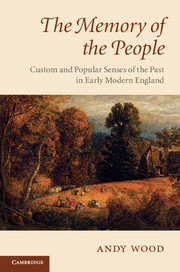Book contents
- Frontmatter
- Dedication
- Contents
- List of figures
- Preface
- List of abbreviations
- Introduction
- 1 Reformation, custom and the end of medieval England
- 2 Custom and popular memory
- 3 Rights, resources and social alignments
- 4 Topographies of remembrance
- 5 Textual and verbal ways of remembering
- 6 The politics of popular memory
- Epilogue.
- Bibliography
- Index
- References
Introduction
Published online by Cambridge University Press: 05 June 2014
- Frontmatter
- Dedication
- Contents
- List of figures
- Preface
- List of abbreviations
- Introduction
- 1 Reformation, custom and the end of medieval England
- 2 Custom and popular memory
- 3 Rights, resources and social alignments
- 4 Topographies of remembrance
- 5 Textual and verbal ways of remembering
- 6 The politics of popular memory
- Epilogue.
- Bibliography
- Index
- References
Summary
The sons of Boaz and the daughters of Ruth
Year after year, under burning summer sun or unseasonal rain, their backs breaking and their calloused hands sore, the gleaners carefully gathered the remnants of the harvest. Century after century, this was the lot of the poor of agrarian England: some were the wives and children of the men who reaped in the fields. Others were old folk without sufficient kin to support them in their declining years. A few were passing vagrants or wandering labourers, who, driven by hope and hunger, sought to blend in amongst the village poor, collect a bag of grain and move on.
God looked upon the gleaners and smiled. The Book of Ruth told them so. The Scriptures describe how divine revelation occurred in the humanized landscape of Bronze Age Palestine within a social structure defined by extremes of wealth and poverty. This was a world that the people of Tudor, Stuart and early Georgian England might have felt that they recognized. The Book of Ruth articulates the ideal social values of this settled, rural society. It tells of how, in a time of famine, the widow Ruth, accompanied by her sons, her aged mother-in-law Naomi and her sister-in-law, set off to the land of Moab, which God had blessed with a rich harvest. On their way, at the time of the barley harvest, they passed by Bethlehem. Naomi had a kinsman there called Boaz, ‘a mighty man of wealth’, and Ruth suggested to the others that they should glean in his fields. As the King James Bible told the story in 1611, ‘Boaz came from Bethlehem, and said unto the reapers, The Lord bee with you; and they answered him, the Lord blesse thee.’ Then came Ruth and asked permission to glean after the reapers; Boaz acceded to the request, adding that they could share the reapers’ food and drink. Ruth asked him, ‘Why have I found grace in thine eyes, that thou shouldest take knowledge of me, seeing I am a stranger?’ to which Boaz replied that he had learnt of her goodness, adding the prayer that ‘The Lord recompense thy worke, and a full reward be given thee of the Lord God of Israel under whose wings thou art come to trust.’
Information
- Type
- Chapter
- Information
- The Memory of the PeopleCustom and Popular Senses of the Past in Early Modern England, pp. 1 - 42Publisher: Cambridge University PressPrint publication year: 2013
